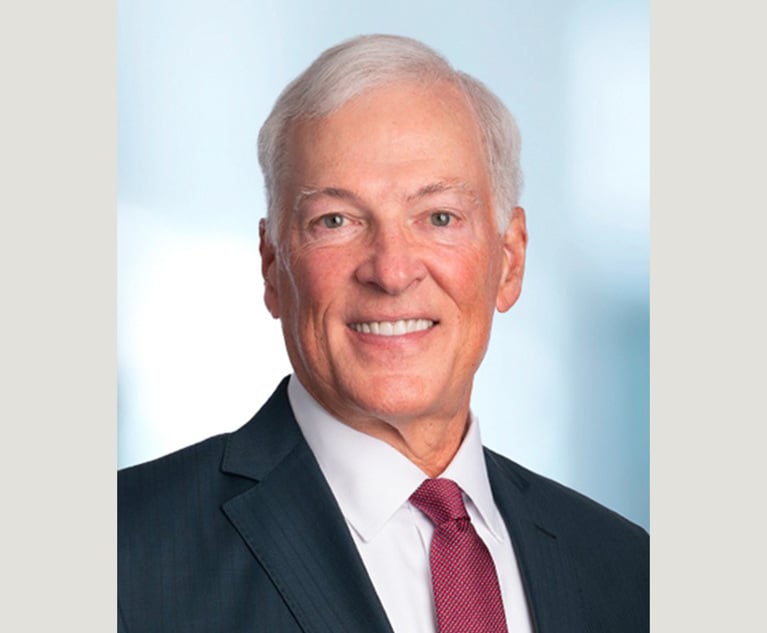Pa. Justices Establish New Test for Work-Product Protection
The Pennsylvania Supreme Court has ruled that a hospital embroiled in litigation with one of its former doctors may not have waived its protection under the attorney work-product doctrine by forwarding emails from its counsel to an outside public relations firm.
June 20, 2019 at 12:45 PM
5 minute read
 Photo: Shutterstock
Photo: Shutterstock
The Pennsylvania Supreme Court has ruled that a hospital embroiled in litigation with one of its former doctors may not have waived its protection under the attorney work-product doctrine by forwarding emails from its counsel to an outside public relations firm.
In reversing a ruling by a three-judge Superior Court panel that had deemed the emails discoverable, the justices in BouSamra v. Excela Health remanded the case to the trial court with directions to engage in “fact finding and application of the newly articulated work product waiver analysis.”
That newly articulated analysis by the Supreme Court majority is premised upon the holding that “the attorney work product doctrine is not waived by disclosure unless the alleged work product is disclosed to an adversary or disclosed in a manner which significantly increases the likelihood that an adversary or anticipated adversary will obtain it.”
The emails in dispute were between defendant Excela Health and its outside counsel. Excela's senior vice president and general counsel, Timothy Fedele, forwarded the emails to Molly Cate, a principal of the hospital's public relations and crisis management consultant, Jarrard Phillips Cate & Hancock. Plaintiff Dr. George BouSamra, who is suing Excela alleging defamation and interference with prospective and actual contractual relations, argued that Fedele's choice to disclose the emails to a third party constituted a waiver of the work-product doctrine and rendered the communications discoverable.
“After an in camera review of the Jarrard documents, it is readily apparent that the email from outside counsel to Fedele constituted attorney work product,” Justice Sallie Updyke Mundy wrote for the majority. “The critical inquiry, then, is whether the work product doctrine was waived.”
Answering that question would require an “intensive analysis” by the trial court regarding whether forwarding the emails to Cate ”'significantly increased the likelihood that an adversary or potential adversary would obtain it,'” Mundy said, quoting language from the Restatement (Third) of the Law Governing Lawyers Section 91(4).
But while the question remains whether Excela waived the work-product doctrine when it forwarded emails from its outside counsel to its outside PR consultant, the justices said there was no question that the hospital waived attorney-client privilege, which requires a heightened level of confidentiality to remain applicable.
Mundy rejected Excela's reliance on the U.S. Court of Appeals for the Second Circuit's 1961 ruling in United States v. Kovel and the Pennsylvania Superior Court's 1995 ruling in Commonwealth v. Noll to support its argument that looping in a third party did not void attorney-client privilege.
“In both cases, the critical fact is that the third-party's presence was either indispensable to the lawyer giving legal advice or facilitated the lawyer's ability to give legal advice to the client,” Mundy said. “That is not the case here. Fedele sending the email in question to Cate, after it was sent to him, did not retroactively assist either outside counsel or Fedele in providing legal advice to Excela. In fact, the email did not solicit advice or input from Cate, nor did the attorney send it to Cate. Thus, this case is not akin to Kovel or Noll, where the third-party's receipt of information facilitated or improved the lawyer's ability to provide legal advice.”
The justices were unanimous in the result, but Justice Christine Donohue, joined by Justices Debra Todd and Kevin Dougherty, wrote a separate concurring opinion advocating for the trial court's work-product waiver analysis to focus heavily on whether Fedele took precautions to safeguard the information he forwarded to Cate.
“As one federal court has keenly observed, 'failure to take adequate precautions to prevent an adversary from obtaining work product information warrants waiver because '[i]ndifference to such a consequence indicates that protection of the immunity was not important to the person claiming the protection,'” Donohue said.
Justice David Wecht penned his own concurring opinion expressing concern that, as courts begin to apply the newly articulated work-product waiver analysis, a too-strict approach “might have a chilling effect on an attorney's ability to disclose work product to third parties, thus undermining the primary aim of the doctrine—to provide an attorney with a zone of privacy within which effectively to represent the client.”
Excela was represented by David Strassburger of Strassburger McKenna Gutnick & Gefsky in Pittsburgh.
“We are looking forward to the opportunity to establish in the trial court that the work-product protection that we've been asserting from the beginning was not waived,” Strassburger said. “We thought the decision of the Supreme Court was thoughtful and correct on that issue and we're pleased with the result.”
Counsel for BouSamra, Elizabeth L. Jenkins of John A. Caputo & Associates in Pittsburgh, could not be reached for comment.
This content has been archived. It is available through our partners, LexisNexis® and Bloomberg Law.
To view this content, please continue to their sites.
Not a Lexis Subscriber?
Subscribe Now
Not a Bloomberg Law Subscriber?
Subscribe Now
NOT FOR REPRINT
© 2025 ALM Global, LLC, All Rights Reserved. Request academic re-use from www.copyright.com. All other uses, submit a request to [email protected]. For more information visit Asset & Logo Licensing.
You Might Like
View All
Saxton & Stump Lands Newly Retired Ex-Chief Judge From Middle District of Pa.
3 minute read
Blank Rome Snags Two Labor and Employment Partners From Stevens & Lee
4 minute read
12-Partner Team 'Surprises' Atlanta Firm’s Leaders With Exit to Launch New Reed Smith Office
4 minute read
Morgan Lewis Shutters Shenzhen Office Less Than Two Years After Launch
Trending Stories
- 1Relaxing Penalties on Discovery Noncompliance Allows Criminal Cases to Get Decided on Merit
- 2Reviewing Judge Merchan's Unconditional Discharge
- 3With New Civil Jury Selection Rule, Litigants Should Carefully Weigh Waiver Risks
- 4Young Lawyers Become Old(er) Lawyers
- 5Caught In the In Between: A Legal Roadmap for the Sandwich Generation
Who Got The Work
J. Brugh Lower of Gibbons has entered an appearance for industrial equipment supplier Devco Corporation in a pending trademark infringement lawsuit. The suit, accusing the defendant of selling knock-off Graco products, was filed Dec. 18 in New Jersey District Court by Rivkin Radler on behalf of Graco Inc. and Graco Minnesota. The case, assigned to U.S. District Judge Zahid N. Quraishi, is 3:24-cv-11294, Graco Inc. et al v. Devco Corporation.
Who Got The Work
Rebecca Maller-Stein and Kent A. Yalowitz of Arnold & Porter Kaye Scholer have entered their appearances for Hanaco Venture Capital and its executives, Lior Prosor and David Frankel, in a pending securities lawsuit. The action, filed on Dec. 24 in New York Southern District Court by Zell, Aron & Co. on behalf of Goldeneye Advisors, accuses the defendants of negligently and fraudulently managing the plaintiff's $1 million investment. The case, assigned to U.S. District Judge Vernon S. Broderick, is 1:24-cv-09918, Goldeneye Advisors, LLC v. Hanaco Venture Capital, Ltd. et al.
Who Got The Work
Attorneys from A&O Shearman has stepped in as defense counsel for Toronto-Dominion Bank and other defendants in a pending securities class action. The suit, filed Dec. 11 in New York Southern District Court by Bleichmar Fonti & Auld, accuses the defendants of concealing the bank's 'pervasive' deficiencies in regards to its compliance with the Bank Secrecy Act and the quality of its anti-money laundering controls. The case, assigned to U.S. District Judge Arun Subramanian, is 1:24-cv-09445, Gonzalez v. The Toronto-Dominion Bank et al.
Who Got The Work
Crown Castle International, a Pennsylvania company providing shared communications infrastructure, has turned to Luke D. Wolf of Gordon Rees Scully Mansukhani to fend off a pending breach-of-contract lawsuit. The court action, filed Nov. 25 in Michigan Eastern District Court by Hooper Hathaway PC on behalf of The Town Residences LLC, accuses Crown Castle of failing to transfer approximately $30,000 in utility payments from T-Mobile in breach of a roof-top lease and assignment agreement. The case, assigned to U.S. District Judge Susan K. Declercq, is 2:24-cv-13131, The Town Residences LLC v. T-Mobile US, Inc. et al.
Who Got The Work
Wilfred P. Coronato and Daniel M. Schwartz of McCarter & English have stepped in as defense counsel to Electrolux Home Products Inc. in a pending product liability lawsuit. The court action, filed Nov. 26 in New York Eastern District Court by Poulos Lopiccolo PC and Nagel Rice LLP on behalf of David Stern, alleges that the defendant's refrigerators’ drawers and shelving repeatedly break and fall apart within months after purchase. The case, assigned to U.S. District Judge Joan M. Azrack, is 2:24-cv-08204, Stern v. Electrolux Home Products, Inc.
Featured Firms
Law Offices of Gary Martin Hays & Associates, P.C.
(470) 294-1674
Law Offices of Mark E. Salomone
(857) 444-6468
Smith & Hassler
(713) 739-1250





